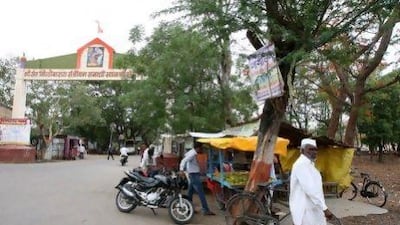RALEGAN SIDDHI, MAHARASHTRA // In the centre of this small town there is a rusty steel pole wrapped in barbed wire.
"This is the pole that we used to tie people to, when they did not listen to Anna Hazare, when he asked them to stop drinking alcohol," said Nana Awari, 25, a tour guide taking a group of Hazare admirers around the village.
"He is a great man," they say, snapping pictures of the room where Mr Hazare stays at the local temple.
Mr Hazare, 75, is an Indian activist best known as the face of the country's anti-corruption movement. His sit-ins and hunger strikes during the past year drew thousands of supporters and were successful in pressuring the government into drafting a stringent anti-corruption bill.
Before his first hunger strike in April last year made him a national celebrity, Mr Hazare was better known for reforming the village of Ralegan Siddhi by banning alcohol, investing in irrigation projects, and helping the underprivileged.
Today, Ralegan Siddhi is a model community, far from the rundown village it was 30 years ago. Tobacco and alcohol are banned, farmers maintain a water reservoir system, troubled children from the city attend a boarding school, and a trust that Mr Hazare is a member of pays for the marriages of the poor and lower-caste.
It also serves as a pilgrimage and tourist attraction for Indians who admire his principles.
Mr Awari tells the story of Mr Hazare returning to the village, where his family held ancestral land, in 1975 after finishing a decade-long career in the military. At the time, the town was suffering from a severe drought and the loss of livelihoods drove many to drink.
"People used to drink so much they used to pass out on the sides of the road. There was no work. The drought and alcohol destroyed lives," said Mr Awari.
In 1978 alcohol was banned in the village.
"We would tie the offender to this electric pole for the whole day," said Mr Awari. There was also reports at the time that said people were flogged for drinking, at times by Mr Hazare himself.
Mr Hazare also contributed a communal well to the village.
"We used to depend on the rains before," said Jivraj Madhav Awari, 60. "We don't have to anymore and that is a blessing. We were shown the way and now our children are reaping the rewards."
In 1980, the village opened a hostel for troubled young boys, and a village school. The boarding school gives failing students a second chance at education.
Dinesh Prakash Nipani, 14, arrived in the village on June 8. His parents sent him there because he was struggling at school.
"I used to hang out with friends, for up to five hours a day after school," he said. "Sometimes, I would skip school too to hang out at the mall."
Former students, such as Pradeep Satkar, 30, and his friends, often return to the village to visit. Mr Satkar started at the village school in 1991. "I was getting into fights, not studying, and I was on the verge of doing drugs," he said.
Today, he owns a construction company and credits Mr Hazare for his success.
Later in the day, Mr Hazare arrives from a trip to Pune, accompanied by several aides and four bodyguards. He goes straight to the communal dining room, where the village's Hind Swaraj Trust offers a lunch of roti, lentils and a kidney bean curry.
While he eats in silence, more than a dozen people gather around for a chance to meet him.
Keila Patel, a salesman, combs his hair and said he hoped Mr Hazare would endorse his herbal products for hair and skin.
"It will be good if he even listens, because that will help a little bit. We can say Annaji has heard about this product," said Mr Patel.
A group of men have brought a troubled child to be admitted to the school. Two women peek from behind one of the mango trees. They have come from a nearby village to complain about their husbands' behaviour.
Mr Hazare speaks a few words only to his aides before he retires for an afternoon nap.
Rajendra Vari came to catch a glimpse of Mr Hazare and tour his village.
"There is a big difference between Anna-then and Anna-now. Now he doesn't mingle. Before he used to come to all the weddings, even in nearby villages. After he returned from Delhi last year, he seems to grow more tired everyday," said Mr Vari.
Follow
The National
on
& Surya Bhattacharya on

